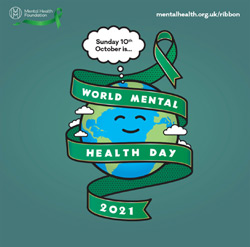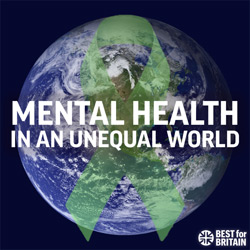 |
|
|
|
Sunday 10th October marks World Mental Health Day. This year, the theme is 'Mental Health in an Unequal World'. The Mental Health Foundation in the UK has announced their Covid Response Programme to deliver targeted support for lone parents, refugees, people from Black and minority ethnic communities, and people living with long term health conditions.
The COVID-19 pandemic has had a negative impact on the mental health of people all over the country and across the world but people who already experience inequality have been far more adversely affected. Examination of further studies including our own Mental Health Impacts of the COVID-19 Pandemic in Scotland on Vulnerable Groups (PDF), has shown that inequalities experienced by some, including lone parents, Black and minority ethnic communities, refugees, and people with long term physical health conditions, have been exacerbated by the pandemic. You can read the full details on the Menta Health Foundation website Meanwhile, the charity organisation, Best For Britain, has issued today a report and campaign news item highlighting their view that poor Mental Health is at least, if not caused by poverty but is exacerbated by it. The organisation says: We think it is hugely important to recognise this crisis is likely to have a huge impact on mental health - and that this in turn will slow Britain’s economic growth and diminish our international standing. And it’s not just at home that the current Government’s abandonment of its responsibilities for the most vulnerable creates the conditions for poor mental health. Cutting funding for global aid and development is worsening the lives of the poorest in the world. They say also that: Mental health is not the lesser cousin of physical health. As the World Health Organisation (WHO) puts it, ‘there is no health without mental health’. Their website, www.bestforbriatain.org, details their campaigning work on the theme of Mental Health In An Unequal World. UK government responses to mental health both domestically and internationally often lack urgency. Perhaps because as a country we repeatedly fail to acknowledge the proven negative effects of poor mental health on individual and societal outcomes. But recently, many of the British Government’s policy decisions have worsened the risk of poor mental health for so many people. Their website and press release goes further and blames the UK Government for the increasing levels of poverty and mental health deterioration: Leaving three million people without access to furlough or self-employment income support during the pandemic, simply because they fell through the cracks, was unforgivable and the groups representing them have cited the negative impact it had on mental health. Compounding this, cuts to the Universal Credit uplift and the decision to increase National Insurance will each put strain on ordinary people’s pockets. As energy prices spiral and firms go bust, the Government is yet to provide any help for consumers who will have to pay increased costs just to keep warm this winter. Best For Britain reminds the public that there is an unequivocal link between economic hardship and mental ill-health: Finally it asks: Poor mental health and economic hardship are two parts of a vicious cycle. We have a choice to break that cycle - but the choice is a political one. Best for Britain’s Affordable Food Deal campaign predicted these problems in 2020, and recommended solutions that the government ignored. You can sign their petition against food poverty here Source: Mental Health Foundation / Best For Britain
|

 Here is art of their press release announcing it:
Here is art of their press release announcing it: